Tech
Digital technologies directly benefit 70 percent of SDG targets, say ITU, UNDP and partners
Published
2 years agoon
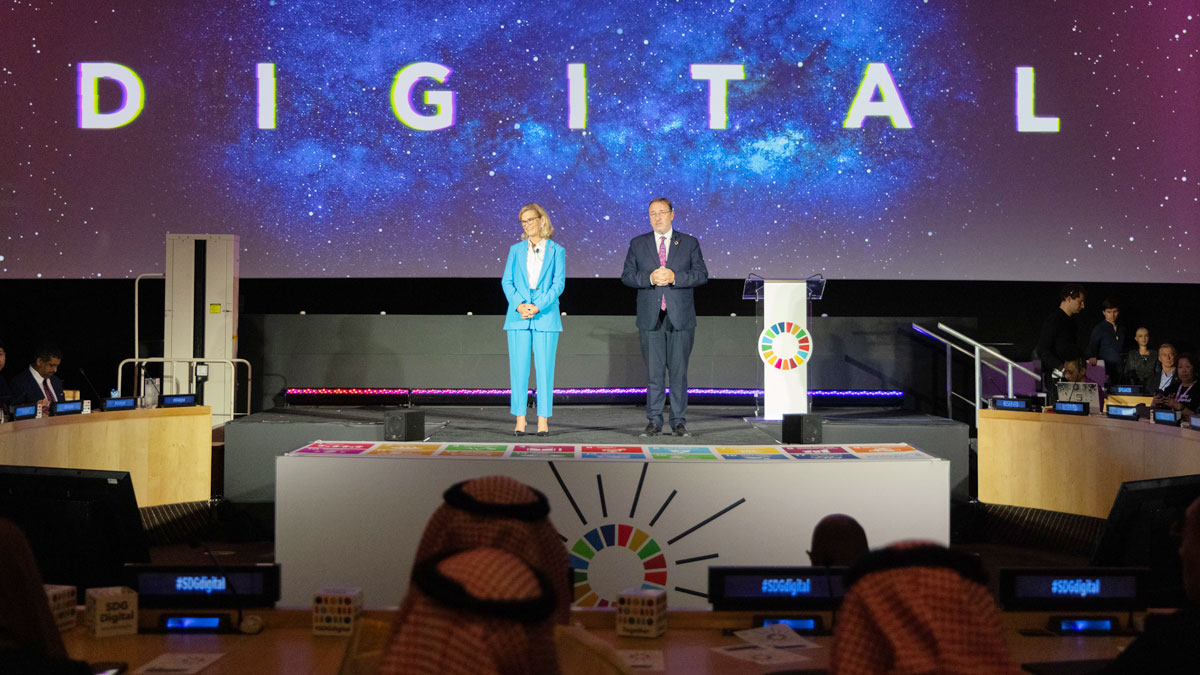
More than two-thirds of the UN’s targets for sustainable development can benefit directly from digital technologies, according to the International Telecommunication Union (ITU) and the United Nations Development Programme (UNDP), organizers of SDG Digital which opened today at United Nations Headquarters in New York.
With digital technologies so closely linked to the Sustainable Development Goals (SDGs), the SDG Digital event highlights how safe, inclusive and scalable digital solutions can put the 2030 Agenda for Sustainable Development back on track amid concerns that the world may miss the vision for people, planet and prosperity that was set in 2015.
The SDG Digital Acceleration Agenda, a global analysis of the connections between digital technologies and sustainable development, was released as part of SDG Digital to provide a roadmap to governments on their digital transformation journey and to promote action and financing.
“With only a fraction of the SDGs on track at the halfway point of the 2030 Agenda, it is urgent to ensure that everyone, everywhere can build their own digital futures,” said ITU Secretary-General Doreen Bogdan-Martin and UNDP Administrator Achim Steiner in the foreword of SDG Digital Acceleration Agenda.“The recent breakthroughs in digital technology have unleashed unprecedented opportunities, and with them new avenues for digital innovation in our race against time to fulfil the promise of the 2030 Agenda.”
Uniting around digital to drive sustainable development
According to UN assessments, progress on half of the 169 SDG targets is either weak or insufficient at the 2030 Agenda’s halfway point. Thirty per cent of the SDG targets have either stalled or gone in reverse.
With digital transformation demanding joint efforts between the private sector, financial institutions, civil society, the UN, governments and young people, SDG Digital brings together experts, policy-makers and business leaders to explore the achievements, gaps and solutions on how digital technologies can support the 2030 Agenda.
Scale and innovation accelerate transformation
The SDG Digital Acceleration Agenda, developed by ITU and UNDP together with Boston Consulting Group (BCG) as knowledge partner, and the Inter-American Development Bank (IDB) as Agenda supporter, shows how digital technologies kickstart economic and societal transformation by creating scale and efficiencies.
The Agenda features digital solutions that are already demonstrating how tech can directly benefit 119 of the 169 SDG targets, or about 70 per cent, including in areas such as climate action, education, hunger and poverty.
“When you look at these game-changing digital solutions, you can see the actual building blocks that can drive us toward universal and meaningful connectivity,” said Bogdan-Martin. “This is how we can – and will – work together to ensure our shared digital future is inclusive, sustainable, and safe and responsible – and to do it in this decade.”
Data in the SDG Digital Acceleration Agenda suggest that countries which improved their digital maturity—as measured by digital affordability and infrastructure indices—outpaced their peers in SDG progress for selected income levels.
The Agenda also profiles the opportunities for sustainable development offered by advancements such as generative AI, 5G networks, and blockchain.
Financing and joint action bring scale and innovation
Digital transformation requires considerable investment in connectivity infrastructure, building up digital skills, and creating the conditions for job retraining and new opportunities.
SDG Digital highlights that the funding gap of over USD3.7 trillion for the SDGs should focus international efforts on enablers—such as infrastructure and connectivity—as well as the pooling of resources through collaboration including the private sector and the utilization of diverse financing methods.
Digital public infrastructure as a catalyst for the SDGs
The formal opening of SDG Digital is part of the UN’s SDG Action Weekend, a series of High Impact Initiatives focused on mobilizing further leadership and investment to bring progress to scale between now and 2030. This includes the UN High Impact Initiative on Digital Public Infrastructure to scale inclusive and open digital ecosystems for the SDGs.
Today’s decisions by countries on how to build their digital public infrastructure (DPI) will have lasting consequences on their opportunity to grow and innovate, and to achieve the SDGs by 2030.
As highlighted in a recent G20 publication supported by UNDP, DPI – built on robust governance and strong local digital ecosystems – can deliver value and high impact across all of the 17 SDGs to leave no one behind.
“Digital public infrastructure represents the ‘roads and bridges’ of our new era on which countries can ‘transport’ a range of vital services to citizens, from e-health and e-government services to online education and social protection,” said Achim Steiner. “As our global community’s shared plan for a better future in the Sustainable Development Goals faces challenges, bold investments in DPI by governments are a tried-and-tested means to get them back on track — an ambition that the UN is matching by empowering 100 countries with a range of now-vital DPI solutions to ensure that everyone, everywhere can build their own digital futures.”
Making connections means progress
Earlier in the week, ITU announced a decline in the number of people worldwide without a connection to the Internet to 2.6 billion people in 2023 from 2.7 billion in 2022.
The statistic on the global offline population is important for tracking connectivity, a foundation of using technology for sustainable development. At the current trend, the global targets for universal and meaningful connectivity are unlikely to be met by 2030.
The SDG Digital event and the SDG Digital Acceleration Agenda are the joint contributions of ITU and UNDP to the UN’s effort to bring stakeholders together at the SDG Action Weekend ahead of the SDG Summit and UN General Assembly High-Level Week.
SDG Digital on-site participants include over 300 hundred leaders from government, civil society, industry, academia, and the UN system.
You may like
-


Countries strengthening cybersecurity efforts, but increased action still required
-
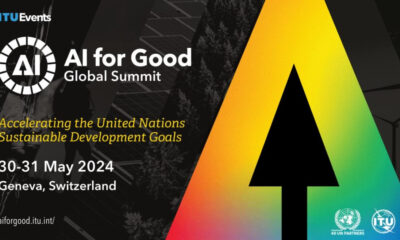

ITU’s AI for Good Global Summit 2024 puts tech to the test for people and planet
-


ITU wins Emmy Award for HDR-TV standard
-
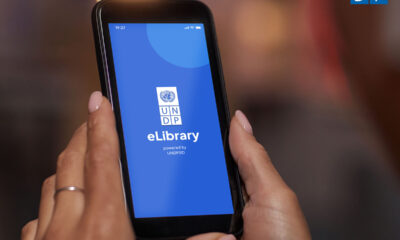

UNDP launches digital library app
-
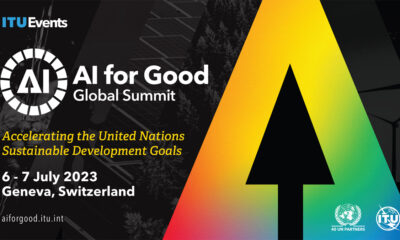

First-ever robot press conference scheduled for ITU’s AI for Good Global Summit
-
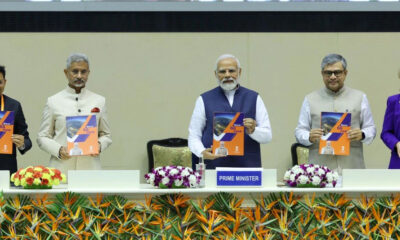

ITU opens Area Office and Innovation Centre in New Delhi
Tech
From Confusion to Clarity: Dheow’s Book Helps Users Master ChatGPT Conversations
Published
3 weeks agoon
November 10, 2025
The much-anticipated book ‘AI Shikhun Taka Gunun’ (Learn AI, Count Money) by ICT writer and journalist Mojahidul Islam Dheow has officially hit the shelves. According to Systech Publications, the book received an overwhelming response even before its release, with more than 1,600 pre-orders placed within the very first week through platforms like Rokomari.com, Prothoma, and other online stores. It is now available at bookstores across Bangladesh, including Systech’s outlet in Banglabazar, Dhaka, at a printed price of Tk 400.
In today’s fast-changing digital world, we stand at a crossroads where a single keystroke can open the door to new income opportunities. Artificial Intelligence (AI) has become humanity’s newest coworker—reshaping how we live, learn, and earn. Mojahidul’s latest book builds a bridge from learning to earning, connecting investigative journalism with public awareness and guiding readers toward practical uses of AI for creativity, innovation, and income generation.
The book is thoughtfully divided into three major parts. The first part serves as an income guide for young learners, showing them how to use AI prompts and tools to find freelance work, generate creative ideas, and turn them into profitable ventures. The second part functions as an investigative toolkit for journalists, offering hands-on advice on data mining, source verification, and cybersecurity using AI applications. The third part caters to general readers, simplifying the complex world of AI and explaining its opportunities and risks in easy, everyday language—from detecting deepfakes and misinformation to understanding how AI is transforming modern life.
Within its chapters, the author introduces over 150 AI tools across more than 30 categories, helping readers explore the most effective AI resources for any purpose—whether for business, work, or personal development. The book highlights tools for AI assistance, video and image generation, automation, meetings, and research. It also discusses AI-powered writing, design, and app-building platforms, alongside innovative AI search engines. Readers will find valuable insights into AI tools for knowledge management, email automation, scheduling, presentations, and even résumé creation. Mojahidul further explores creative fields such as AI-generated voice and music, as well as marketing innovations that promise to revolutionize both productivity and imagination in the digital age.
Md. Mojahidul Islam Dheow, a computer science graduate, has been an active voice in ICT writing since 2003 and has authored over a dozen books. His title Web Database Application: MySQL-PHP was the first Bangla-language book on web database and application development, earning him the Bestseller Award in 2021. His writing style is lively, accessible, and deeply engaging—sometimes technically detailed, sometimes playfully conversational. Reading his work feels like chatting with a tech-savvy friend who’s eager to share smart digital tricks over a cup of coffee.
There are plenty of reasons to read AI Shikhun, Taka Gunun. Whether you’re a beginner looking to start freelancing, a journalist interested in mastering AI-driven investigative tools, or a curious reader eager to understand how AI is reshaping everyday life, this book speaks to all audiences with equal clarity and enthusiasm. Ultimately, Learn AI, Count Money is more than just a book—it’s a complete roadmap for thriving in the era of artificial intelligence.
Speaking about his new release, Mojahidul Islam Dheow shared his vision for the book:“This book reveals countless ways to earn through AI. You can use AI content tools to offer writing services, manage brands and social media accounts, or provide AI-powered SEO solutions. You can even build and sell your own custom GPTs! If you’re creative, AI-generated art and images can become great sources of online income. Similarly, AI-driven affiliate marketing, ad management, and optimization are becoming increasingly popular.
Many people struggle to find the right prompts that bring out useful and engaging responses from ChatGPT. It can be frustrating to spend time crafting questions only to get results that miss the mark. That’s where this guide comes in. In this book, I’ve compiled a collection of over 500 effective prompts designed to spark creative and insightful responses. For example, if you’re writing about travel, instead of asking, ‘Tell me about traveling,’ try, ‘Describe a perfect day in Paris, from breakfast to dinner.’ The same logic applies to IT support—rather than asking, ‘How do I fix my computer?’ ask, ‘How can I speed up my Wi-Fi on Windows 11?’ The more specific your prompt, the clearer and more helpful the answer will be.
Translation and localization services powered by AI also open up easy income opportunities. You can create and sell digital products, offer AI tutoring, or launch online courses. Building AI-powered websites, managing email campaigns, developing chatbots or mobile apps—even automating lead generation—AI offers endless possibilities. Finally, AI is now an incredible assistant in data collection, management, and analysis. You can even generate AI-based video content and monetize it on video platforms.”
Through AI Shikhun, Taka Gunun, Mojahidul Islam Dheow once again proves his mastery in blending technology with practical wisdom. His latest work doesn’t just teach readers about AI—it empowers them to turn knowledge into action, and curiosity into income, in the exciting new world of artificial intelligence.
Tech
Pre-Orders Open for Mojahidul Islam’s Latest Computer Book ‘AI Shikhun, Taka Gunun’
Published
3 months agoon
September 12, 2025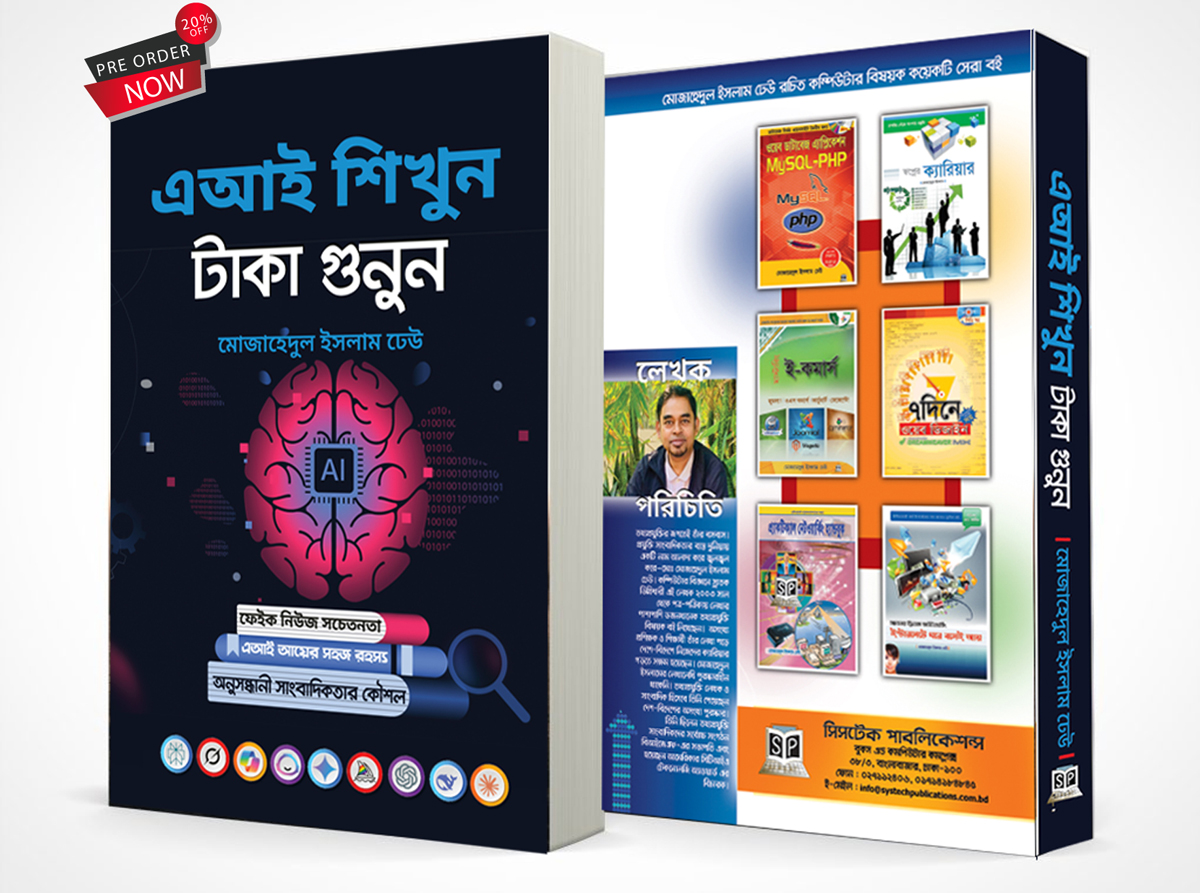
Technology writer and journalist Mojahidul Islam Dheow is set to release his new book, “AI Sikhun, Taka Gunun.”
Online pre-orders have already started, and the book is being published by Systech Publications.
In today’s digital age, we stand at a turning point—where simple keystrokes can turn into dollars, and Artificial Intelligence (AI) is becoming humanity’s newest coworker.
This book acts as a bridge, connecting learning with earning and blending investigative journalism with awareness-raising for general readers. The book is structured into three parts.
The first section is designed as an earning guide for young people. It explains how AI content prompts can create opportunities in the freelancing market and how small ideas can grow into significant income streams.
The second section serves as a hands-on investigative handbook for journalists, offering practical tips on using AI tools for data mining, verifying sources, and ensuring cybersecurity.
The third section is aimed at general readers. It presents the opportunities and risks of AI in simple language while also teaching methods for spotting deepfakes and identifying fake news.
Mojahidul Islam Dheow, a Computer Science graduate, has been writing and publishing technology-related books since 2003, with more than a dozen titles to his name.
His book “Web Database Application: MySQL–PHP” was the first Bangla-language book on website database and application development, earning him the Best Author Award in 2021. Dheow’s writing style is lively and accessible—sometimes deeply technical, sometimes witty and lighthearted. His words make readers feel as though they are casually learning new hacks while chatting with a friend.
This book is equally valuable for three key audiences: those who want to start freelancing but don’t know how to begin, journalists eager to learn the magic of AI-powered data tools, and everyday readers curious about how AI is reshaping our daily lives.
All in all, “AI Sikhun, Taka Gunun” is not just another book—it is a complete roadmap for surviving and thriving in the age of AI.
According to the author, the book will help readers discover numerous exciting ways to earn with AI. These include offering writing services with AI content tools, managing brands and social media accounts, providing AI-powered SEO services, creating and selling custom GPTs, producing AI-generated art and images, affiliate marketing, optimizing paid advertising, offering translation and localization services, developing and selling AI-powered digital products, teaching and hosting online courses, building websites and running email marketing campaigns, creating AI chatbots for businesses, developing mobile apps, automating lead generation, managing and analyzing data, and even producing AI-powered YouTube content.
The printed price is 400 Taka. If pre-ordered, the book can be purchased at a 20% discount for 320 Taka at https://www.rokomari.com/book/504542/ai-shikhun-taka-gunun.
Tech
A10 Networks Expands its Cybersecurity Portfolio with Acquisition of ThreatX Protect
Published
9 months agoon
March 13, 2025
ThreatX Protect Addresses Critical Need to Protect Against Evolving Application and API Security Threats
To continue to help customers address the rapidly evolving cyber threat landscape, A10 Networks has acquired the assets and key personnel of ThreatX Protect expanding its cybersecurity portfolio with web application and API protection (WAAP). The acquisition is expected to be modestly accretive to A10’s earnings per share in 2025 and has closed.
Attacks against web applications and application programming interfaces (APIs) are on the rise and are a significant threat to enterprises. ThreatX Protect provides a unique WAAP solution using behavioral and risk profiling to help protect enterprises from evolving threats, including threats to AI applications, which can complement an AI firewall. Delivered as a software-as-a service solution, ThreatX Protect includes API protection, bot management and next-generation web application firewall.
“Expanding the A10 Defend security portfolio with ThreatX Protect gives our customers an additional tool in their strategy to protect against new and evolving threats,” said Dhrupad Trivedi, president and CEO, A10 Networks. “Our strategic focus is on helping enterprises secure their applications and networks from the growing number of threats today, as well as protecting the emerging AI use cases of the future. Adding WAAP to our solution set gives customers additional capabilities to help establish a strong security posture.”
“We are thrilled that A10 Networks has acquired certain assets of ThreatX, including the brand and the TX Protect WAAP solution to expand A10’s security portfolio,” said Gene Fay, CEO of ThreatX. “A10 has been a fantastic partner throughout this process, and we are confident that our customers and employees will thrive under their leadership.”
As a result of this transition, the remaining assets of ThreatX will be launched as Run Security with TX Prevent, the cutting-edge eBPF-based solution re-launched as RS Prevent.
ThreatX Protect supports A10’s strategy of helping customers deploy A10 security solutions in a hybrid approach to protect apps and APIs running anywhere – public cloud, private cloud, co- location facilities or on-premises. The A10 Defend portfolio of solutions provides DDoS protection, DDoS threat intelligence and web application, and now adds a full-featured WAAP solution all integrated into a single platform with end-to-end delivery and stronger security for mission-critical applications.
Specific terms of the transaction were not disclosed. The acquisition is consistent with A10’s stated strategy of expanding the Company’s security portfolio to grow in the enterprise market. The acquisition does not represent a material change to the Company’s 2025 financial outlook or long-term business model.

From Confusion to Clarity: Dheow’s Book Helps Users Master ChatGPT Conversations

Pre-Orders Open for Mojahidul Islam’s Latest Computer Book ‘AI Shikhun, Taka Gunun’

Bangladesh’s Press at a Crossroads: Between Promises of Reform and the Shadows of Repression










